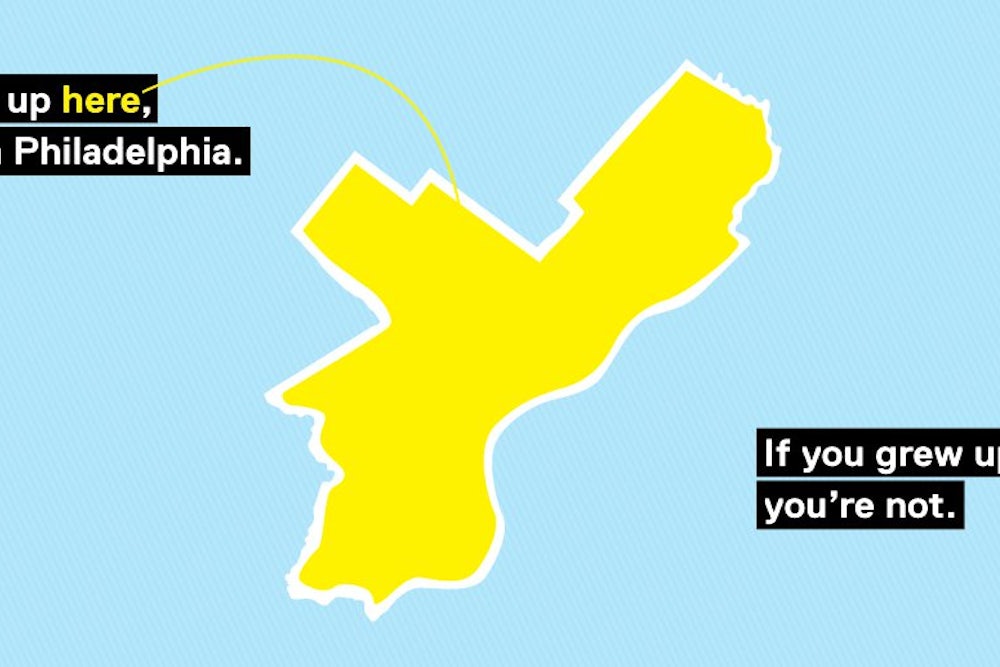Say we meet at a party. You're from a suburb, or perhaps even a rural community, but when I ask you where you’re from, you feel compelled to outright lie. “I’m from New York,” the New Brunswick native replies. “San Francisco,” says the girl who grew up in Danville. “Philly,” claims the guy from Radnor who has no idea that he’s talking to a Philly native. Philadelphia proper, that is. Not the metropolitan area: inside the city lines.
City kids have long had to endure countless awkward encounters in which our conversational partner claims to be from our native city, but upon further questioning (“Oh, you’re from Philly too? Which part?”) turns out to be the native son of a small town 45 minutes deep into the rolling hills of suburbia. Sure, we might still have plenty in common, but now that guy has lied to me, made a chump of himself, and set the groundwork for what’s about to be an exceedingly uncomfortable conversational extraction.
So why not just tell the truth?
These hometown fabulists—let’s call them Faux Urbanites—defend themselves by claiming it’s easier to name the nearest big city as your hometown than to explain where exactly Strasburg, Colorado, is. Recently, an article in The Atlantic’s CityLab backed up that very argument, saying, “At simplest, it's a matter of convenience; it can indeed be easier, and faster, to tell someone whom you assume does not know the intricacies of New England that you're from Boston, when in fact you're from Cumberland, Maine.” But it really isn’t that taxing to add a few short words that properly explain a town’s location. It’s just four short syllabic steps from “I’m from Los Angeles” to “I’m from a suburb of Los Angeles.” And from there, it’s just a few more words of explanation to start coloring in the details of your upbringing.
That same CityLab piece explains that because of the explosion in suburban population growth, “the stereotypes of the suburban/urban dichotomy in most cases no longer hold true.” It then asks: “So why insist on cordoning off a city name from a sub/exurbanite who wants to use it?” It’s a good question to ask, as suburban rings ripple further and further out from metropolitan areas. But let’s not kid ourselves: growing up in a city and growing up near a city are not the same thing, for the very reason that cities and suburbs are not the same thing (no matter how much our exurbs and suburbs are growing). And would we really want them to be? If they were too similar, there would be no reason to travel from one to the other, except when work compelled us to. What a dreary metropolitan existence.
I’m proud to come of my hometown—proud that, as a kid, I could rattle off Philly’s neighborhoods and understand the cultural intricacies of each one, a kid who loved watching the cityscape change as I took the bus deeper into Philly to my grandmother’s house, who knew which areas were dangerous and which were gentrifying (thanks to my father, a police officer). I can't deny my urban elitism, but this isn’t just a city girl’s rant against suburbanites claiming to be from my hometown. The deeper problem with Faux Urbanites is they’re doing a disservice to both their own hometowns—are you so ashamed to say where you’re from?—and to the art of conversation itself. After all, the point of asking the question “Where are you from?” isn’t to quickly hear the answer and get it out of the way. It’s to start a conversation that illuminates how your life experiences have shaped you. Clinging to the closest big city as an anchor won’t do that.
My fiance, for instance, is from a Texas town so small and farflung that other West Texans have never heard of it. It has one stoplight, the prerequisite Dairy Queen, and a rather exaggerated “Population: 2,124” sign. (If you’ve heard of Hamlin, I’ll give you my firstborn.) My fiance has found that the best way to describe where he’s from is to lead with a little hometown pride: “I’m from a really small town in West Texas called Hamlin.” Then he’ll follow up with a question: “Have you ever heard of Abilene?” When responders inevitably say they haven’t heard of it, he offers a geographical description: “It’s four hours west of Dallas.” The he gives a cultural one: “It’s a lot like the town in Friday Night Lights, except way smaller and no Minka Kelly.” The other person’s eyes finally widen with recognition, and thus begins a conversation about the insanity of Texas high school football.
And isn't that a much better start to a conversation than meekly admitting you lied about where you're from?
